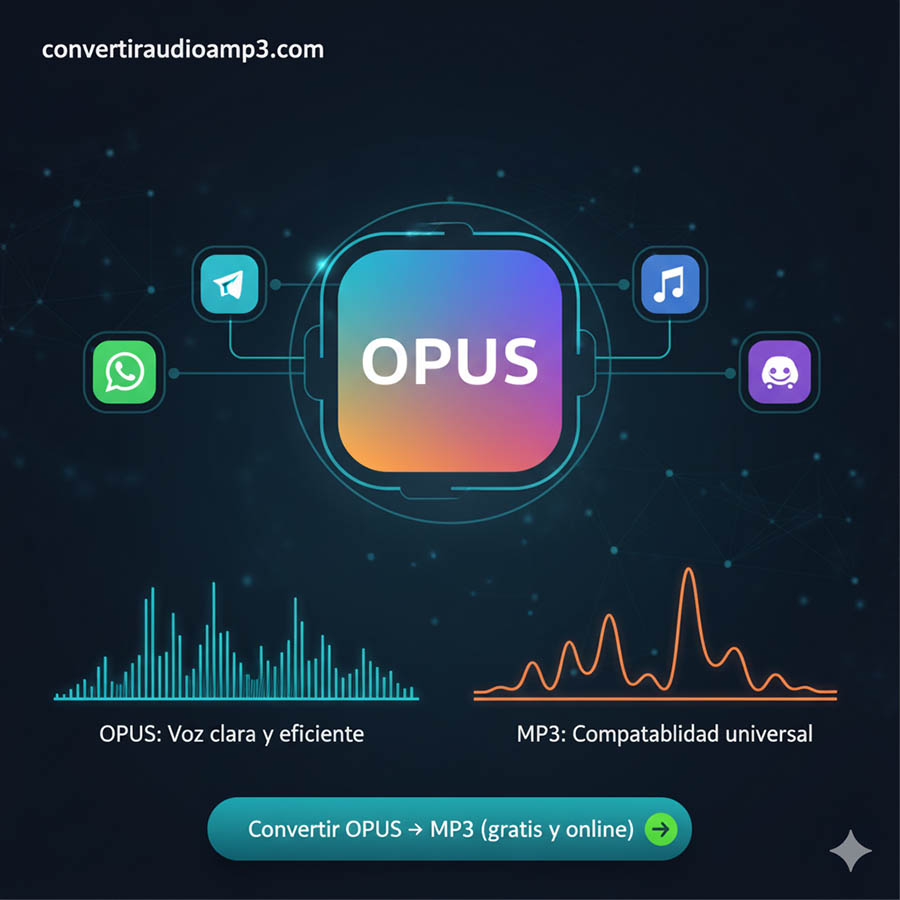OPUS: the audio format of the future and why apps use it
You’ve surely heard of MP3, but do you know the OPUS format? If you use WhatsApp, Telegram, or Discord—or enjoy music on Spotify (in some cases)—you’re likely interacting with OPUS audio without realizing it. This codec, which can sometimes cause compatibility headaches, is actually a technological marvel built for the modern digital world.
In this article we break down what OPUS is, why it’s become the standard for voice communication and low-latency streaming, and how it compares with other popular formats.
✨ Need to convert an OPUS file? Do it now!
Convert OPUS to MP3 (free & online)100% online • Works with WhatsApp and Telegram
What is the OPUS format and how did it start?
OPUS is an audio codec developed by the Xiph.Org Foundation (creators of Ogg Vorbis and FLAC) and standardized by the IETF (Internet Engineering Task Force). The goal was a versatile, open, royalty-free format that could handle anything—from real-time speech to high-fidelity music—while being exceptionally efficient.
Released in 2012, OPUS fused the best of two prior technologies: SILK, optimized for low-latency speech (e.g., VoIP calls), and CELT, designed for wideband music/audio. This combo lets OPUS adapt dynamically to bandwidth and content, making it ideal for the internet.
The magic of OPUS: why is it so efficient?
Its efficiency comes from adaptively adjusting bitrate. It can range from very low bitrates (~6 kbps) for rough speech up to much higher bitrates (up to ~510 kbps) for high-quality music.
- Low latency: Essential for real-time communication. When you talk on WhatsApp or Discord, audio arrives almost instantly.
- Great quality at low bitrates: Where other formats struggle, OPUS shines—clear speech even with tiny files.
- Versatility: Not just for speech. It encodes music with quality comparable to or better than MP3/AAC at similar bitrates.
- Open and royalty-free: This has encouraged broad adoption by developers and companies.
This blend of flexibility and performance has made OPUS the codec of choice for services that need efficient, high-quality voice over the internet.
OPUS vs MP3: who wins in the real world?
OPUS is a heavyweight for voice/streaming efficiency, while MP3 remains the compatibility champion. Quick comparison:
| Feature | OPUS | MP3 |
|---|---|---|
| Efficiency (size/quality) | Superior, especially for speech | Good, but older |
| Latency | Very low (great for real-time voice) | Higher |
| Compatibility | Limited (modern browsers, specific apps) | Universal (almost all devices/software) |
| Typical use | In-app voice, video calls, streaming | Music, audio for legacy/physical players |
Each format has its sweet spot: OPUS rules online communication, while MP3 is the “wild card” when you need an audio file that plays anywhere—from the car to older players.
Why your WhatsApp audios are OPUS (and what to do about it)
Messaging apps like WhatsApp and Telegram chose OPUS for its unmatched efficiency with speech. That means quick sends, solid quality—even on slow connections—and low data usage.
The issue appears when you take those files out of the app. Your car stereo, an old MP3 player, some editors, or even certain video players may not recognize .opus (sometimes wrapped in .ogg).
That’s where a good converter comes in. If you want your voice messages, important notes, or personal recordings to work everywhere, the simplest, most universal solution is to convert them to MP3.
✅ Take your OPUS audios anywhere
Convert OPUS to MP3 (in seconds)The easiest way to ensure compatibility
The future of audio online
OPUS has changed how we share and consume audio online. Its flexibility and performance make it a key format for the future—especially with the rise of video calls, podcasts, and interactive streaming.
While native OPUS support keeps growing, MP3 will remain indispensable thanks to its universality. Knowing the differences—and how to convert between them—gives you full control over your audio files.
Related articles you might like:
- CBR vs VBR vs ABR: which compression is right for you?
- MP3 vs MP4: beyond audio and video
- Modern audio formats: OPUS, AAC, ALAC and their benefits
- Voice messages to MP3: myths, sizes, and compatibility
Fast • Free • Online
